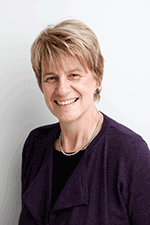
Professor Sally Kendall, Professor of Nursing, Director of the Centre for Research in Primary and Community Care (CRIPACC) and Associate Dean of Research (School of Health and Social Work, University of Hertfordshire).
From ‘Nurse’, to ‘Professor’, to job-sharing ‘Associate Dean of Research’.
“You can’t sit back and wait for things to drop in your lap. Carpe Diem!”
I always think the actual choice of course I made as a school leaver was important. I believe doing a 4-year degree programme, where we were able to undertake a piece of research in a clinical area, which included hands-on data collecting, analysis and writing up, was a positive right from the start.
I had developed a taste for research during my studies. I remember thinking, as a practising health visitor, I would love to do research and started looking through the Education section of the Guardian. I was fortunate enough to come across an opportunity at King’s College to work as a research officer on a funded project. One of the great enablers for me was that the person leading the project at King’s became my mentor and encouraged me to do my PhD, which I hadn’t considered before. I was lucky as I was given sufficient time to undertake a part-time PhD in an area related to my project.
Another enabler was being with peers in a College where research was valued. That was really a great leg-up. I am grateful I obtained my PhD before I became thirty, because it is so difficult to be a practicing clinical nurse and an academic. For some this is not even a possibility. People came into HE never thinking they would become ‘proper’ academics.
Four years into my PhD my daughter arrived. I remember getting up in the mornings when she was asleep and writing. It was something I managed to do with the right kind of support from home and from my supervisor. I had by that point managed to secure a lectureship at Buckingham College. They offered me the job as they knew I was so close to completing my PhD and they wanted research active people. I went part-time for a term once my daughter was born and then reverted back to full-time, working in a supportive environment with good colleagues. The University, keen to invest in research, allocated six studentships to my department. Within 5 or 6 years I was able to get successful PhD students and grants. Some of it was rather scary! But I always had my original mentor in the background. Looking back I think “Goodness, how did I have a clue what I was doing!”; but somehow, I did. We grew a research unit from nothing.
I had a strong CV by the time a Professorship came up at the University of Hertfordshire in 1999. At the time there were so few PhD nurses around, that I think the Dean wanted someone who had ticked all those boxes, and I apparently did!
When I came to the University of Hertfordshire in 1999, the Faculty had achieved a ‘2’ at the RAE (nationally recognised research), which was considered fantastic. The next RAE was 2001 and I was expected to lead the submission. Again, I must have felt brave enough to do it! I initiated connections between our Centre for Research in Primary and Community Care (CRIPACC) and the Faculty, suggesting we work together towards a common submission. I nearly fell off my knees when I found out we had achieved a ‘4’ (internationally recognised research).
I talked to the Dean and suggested that the new Director of CRIPACC should be a Professor of Nursing, and I got the job in 2001. The Centre started to grow: we went from 10 to 20 people in 2008. We are now 44. What is pleasing is to see others coming in at junior levels progressing to research leaders and running their own research programmes. It has been lovely to see how people have grown.

Due to restructuring at the university, I knew that a 0.6 role of Associate Dean of Research for the new School was coming up. I wanted the role, but questioned how much more can I take on; a colleague and I decided to propose a job-share to the Dean. We thought we could each get more out of a 0.3 post. He took a bit of persuading, but it happened. We share responsibilities for committees, share ideas, and look at things as two heads instead of one; and it meant I could continue my research and my CRIPACC work. I think every job should provide an opportunity to job-share. I did my research before proposing the Associate Dean job-share to my Dean, and apparently organisations benefit from job-shares. I think it definitely works.
I do lots of external activities, including co-Chairing the International Collaboration of Community Health Nursing Research (www.icchnr.org). But what lies behind success, is one thing that I’m good at: ideas. I can see the picture before it happens, and I try to follow ideas through.
In academia, there is so much rejection and you have to see rejection as part of the job. Don’t take it as a personal affront. Make the most of success, and enable others to develop from those successes. You have to pick yourself up and carry on doing what you do and do it well. You learn something every time from an obstacle. In a way, my career has been a series of opportunities I have had to be brave enough to take, always enabled by supportive people in the background.




Leave a Reply